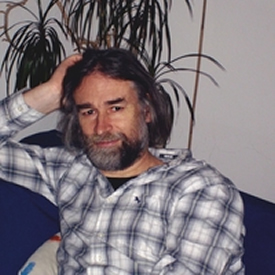De Duits-Israëlische dichter en schrijver Jehuda Amichai werd op 3 mei 1924 geboren in Würzburg. Zie ook alle tags voor Jehuda Amichai op dit blog.
Great Serenity: Questions and Answers
People in a hall that’s lit so brightly
It hurts
Spoke of religion
In the lives of contemporary people
And on the place of God
People spoke in excited voices
Like in an airport
I left them
I opened an iron door that had written on it
“Emergency and I entered within.
Great serenity: Questions and answers
My Father
The memory of my father is wrapped up in
white paper, like sandwiches taken for a day at work.
Just as a magician takes towers and rabbits
out of his hat, he drew love from his small body,
and the rivers of his hands
overflowed with good deeds.
My Child Wafts Peace
My child wafts peace.
When I lean over him,
It is not just the smell of soap.
All the people were children wafting peace.
(And in the whole land, not even one
Millstone remained that still turned).
Oh, the land torn like clothes
That can’t be mended.
Hard, lonely fathers even in the cave of the Makhpela*
Childless silence.
My child wafts peace.
His mother’s womb promised him
What God cannot
Promise us.
* The traditional burial place in Hebron of Abraham
and the other Patriarchs and Matriarchs of Israel.
Vertaald door Benjamin en Barbara Harshav
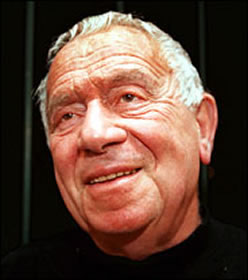
Jehuda Amichai (3 mei 1924 – 22 september 2000)
Foto: Rina Castelnuovo
De Nederlandse dichter Erik Lindner werd geboren op 3 mei 1968 in Den Haag. Zie ook alle tags voor Erik Lindner op dit blog.
Wandeling
Om het Onland, heide met jeneverbesstruik.
Ik kroop onder de struik en vond een kind, een baby nog,
met wit gezicht. De armpjes opgericht alsof ze iets of iemand
wegduwden, afweerden, weerhielden. De handen daarop horizontaal, voetstukken op pilaren. De blik van het kind zei dat het gevaar voorlopig niet was geweken.
Kon ik het oppakken? Kon ik het in mijn armen nemen en
voorovergebogen de geur van het hoofd, de lichte haarinplan-
ting waarnemen? Het kind bezag me met minachting. Ik
inspecteerde het lichaam op kneuzingen, wondjes, schrammen.
Het kind keek mee. Het kind keek waar ik keek.
Verder op de weg staken we een rivier over.
Bomen buigen weg van de kust
Bomen buigen weg van de kust
voor het huis schuift een steiger
de rechte gevel en rechte steiger
zijn bomen die naar je wuiven
het huis vanuit een rijdende tram
helt in de wind die van zee komt
je buigt je hoofd onder de steiger
kijkt naar buiten als je thuis bent.
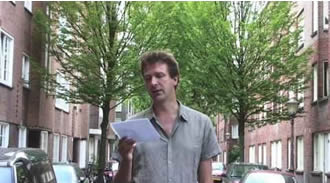
Erik Lindner (Den Haag, 3 mei 1968)
De Belgische dichter en schrijver Johan de Boose werd geboren in Gent op 3 mei 1962. Zie ook alle tags voor Johan de Boose op dit blog.
Uit: De vrijheid van zwijgen
Na elke bocht verandert wat ik wist.
Ik dacht, ik ken het landschap maar
Hoe het zich verwijdert. (Er is iets met het licht.)
*
Ik weet, het zijn de groeven in mijn lichaam.
Het zijn verwensingen van lieverlee
Niet te vermijden. (Afzien van schoonheid.)
*
Reizend heb ik een geduldig lijnenlabyrint
Getekend. Het is de schets van een gezicht,
Mij welbekend. (Een spiegelschrift.)
*
Ik blijf vertrekken en verdwalen. Het is
Nooit af. Sta toe dat anderen gaan baden
In de volgelopen holten. (Waken in liefde.)
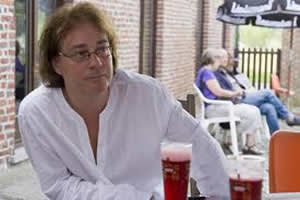
Johan de Boose (Gent, 3 mei 1962)
De Britse schrijver en komiek Ben Elton werd geboren in Londen op 3 mei 1959. Zie ook alle tags voor Ben Elton op dit blog.
Uit: Chart Throb
‘I just want this so much,’ she repeated. ‘I really, really do. I want it so much. It’s all I ever wanted. Since I was a little girl . . . It’s my . . . It’s my . . .’
At the very last linguistic hurdle, emotion defeated Shaiana and words failed her.
‘Dream?’ Keely coaxed. ‘Is it your dream? Is that what you’re trying to tell us? That it’s your dream?’
‘That’s right, Keely,’ Shaiana sniffed. ‘That is so right. It’s my dream.’
Keely’s bronzed, cadaverously muscular arms enfolded Shaiana’s shoulders. Momentarily entwined, they made quite a contrast: the golden girl and the girl with the dream. It all looked slightly uncomfortable as Shaiana’s arm (the one which she had raised to wipe away the famous tear) became trapped in Keely’s skeletal embrace. Briefly Shaiana’s hand rested in the hollow of Keely’s armpit and Keely’s teeth rattled against Shaiana’s big hoop earrings. Neither woman seemed to notice the awkwardness or if they did, they did not care. Emotions were running too high. It was all too much.
‘You go, girl,’ Keely whispered. ‘Just you go, girl.’
‘Yeah,’ Shaiana sniffed, raising her eyes towards what would have been the stars had it not been daytime and had she not been indoors. ‘God gave me this chance and I’m going to rock their asses!’
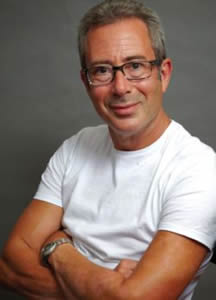
Ben Elton (Londen, 3 mei 1959)
De Duitse schrijver Jens Wonneberger werd in Großröhrsdorf geboren op 3 mei 1960. Zie ook alle tags voor Jens Wonneberger op dit blog.
Uit: P. Dienemann Nachf.
„P. Dienemann Nachf., Buchhandlung und Antiquariat, befindet sich in der Nähe vom Bahnhof Neustadt in einem alten Haus, dessen Eingang man nur über den Hof erreicht.
Vor der Haustür liegt ein Gitterrost aus Stahl. Bitte die Füße abtreten, steht auf einem Schild an der Haustür.
Vor der Zwischentür liegt ein Fußabtreter aus Bürsten. Bitte die Füße abstreichen, steht auf einem Schild an der Zwischentür.
Vor der Ladentür liegt eine Fußmatte aus Kokos. Auf dem Schild an der Ladentür steht, Bitte die Füße sorgfältig abstreichen.
P. Dienemann Nachf. ist privat. Privat heißt, daß am Montag geschlossen ist. Hier gehen die Uhren anders, sagt Fräulein Leukroth. Fräulein Leukroth ist die Tochter des Nachfolgers und in einem Alter, in dem das Wort Fräulein eine Offenbarung ist. Sie kommt jeden Morgen mit gesenktem Kopf und kleinen, schnellen Schritten in das Geschäft. Jeden Morgen trägt sie ein anderes Kleid. Die Kleider sehen alle gleich aus. Jeden Morgen trägt Fräulein Leukroth einen Stoffbeutel ins Geschäft, der aussieht wie ihr Kleid. Wenn sie kommt, hat sie einen steifen Arm, der beim Gehen fast den Boden berührt. Bevor sie das Geschäft betritt, hat sie sich zweimal normal und einmal sorgfältig die Schuhe abgetreten. Das Linoleum im Laden ist so oft gebohnert worden, daß es kein Muster mehr hat, nur auf den vier kleinen Kreisen um die Füße eines Tisches ist es noch zu erkennen.“
Jens Wonneberger (Großröhrsdorf, 3 mei 1960)
Zie voor nog meer schrijvers van de 3e mei ook mijn vorige blog van vandaag.

